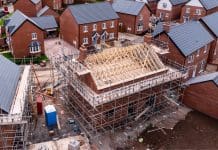Can modular construction improve affordability? The simple answer is yes, but, when it comes to modular construction, there are a lot more benefits involved than just cutting costs
But first, what is modular construction?
Modular construction 101
Modular construction is not a completed product, it is a process. The modular construction process means that most of the construction of a modular building or modular structure is constructed offsite in controlled conditions in an assembly-line-like factory. These modular units use the same building codes, standards, and practices that a conventionally constructed building uses.
But unlike conventional construction, modular construction is a much faster and more efficient process that can take up to half the amount of time that is usually needed for on-site construction. Commercial modular buildings are comprised of multiple modules (hence the term, ‘modular’) which are manufactured in an assembly-line-style factory. When these modular units are put together on-site they form one component or unit – one structure (or multiple structures depending on the project).
These modular units are easier to construct, cost-effective, and fast – projects using modular construction are very fast to assemble.
Since most of these units are built offsite, all that’s left is delivering the modules and installing them in place, along with finishing touches like connecting plumbing, etc.
The average cost of construction
Every construction project is unique and brings with it a wide array of expenses. Site planning, design, materials, equipment, labour and insurance, just to name a few. A typical construction project will begin incurring costs before the first shovel strikes the ground. From paying the architect to the building appraiser, depending on your construction project, the costs can vary greatly.
A significant number of construction projects also incur substantial losses when it comes to overages; budgets are set with a deadline and when deadlines aren’t met, the budget is exceeded and substantial costs are incurred.
In construction projects, budget and project timeline overages have become extremely common. According to a study conducted by KPMG, in the past 3 years, just 31% of all construction projects came within a tenth of the budget. That means only a third of projects even come close to staying on budget.
On average, construction costs are about $416 per square foot. In 2018, construction costs rose 5.7%.
Some of the cities with the steepest rise include:
- Chicago – 7.6%
- Portland – 7.1%
- San Francisco – 6.7%
- New York – 4.5%
Now more than ever it’s important for modular construction to be adopted as a common approach to construction. Whether it’s for a small business or a large business, a modular construction company can save you time, money, and create a finished project that you’re proud of.
Traditional losses in on-site construction
When you’re constructing a building on-site it can create a plethora of possibilities for needless waste and loss of materials which can lead to financial accidents.
Traditional losses in on-site construction include:
- Lack of security leaving materials exposed to theft.
- Leaving building supplies exposed to the elements
- General confusion associated with a disorganised job site
- Labour losses due to mismanagement
One of the primary losses when it comes to construction is labour. Labour can create a host of lost revenue for businesses.
There’s a skilled trade labour shortage. With a lack of skilled labour on hand, many construction businesses are forced to pay overtime. Studies have shown a 10% decrease in productivity for every additional 10 hours added on a worker’s week. This spend on overtime, in addition to the loss of productivity, leads to overages.
How modular construction is cost-effective
Modular projects can reduce a project’s construction schedule by up to 50 percent, when compared to traditional construction methods. Here are just some of the cost-saving benefits of modular construction:
- Reduced material waste
- Speed of build leads to quicker occupancy and revenue generation
- Less site disruption
- Reduced on-site labour
These are just a few reasons why you should consider modular construction. Many of the areas in which money is lost in traditional construction is where modular construction is streamlined.
Saving money, means saving time
Modular construction can improve affordability when it comes to any construction venture. Offsite construction is effective at saving time and costs, as well as generating an amazingly solid and resilient structure.
As previously stated, labour can be one of the more costly aspects of construction, but with offsite construction, modular companies use factory labour, which is as much as 70% less expensive than typical on-site construction labour. What this means is that the shorter the time it takes on a particular project, the faster that project can begin producing income. On a big project, this can add up to an incredible savings.
Deluxe Modular
Twitter: @deluxemodular
LinkedIn: Deluxe Modular














